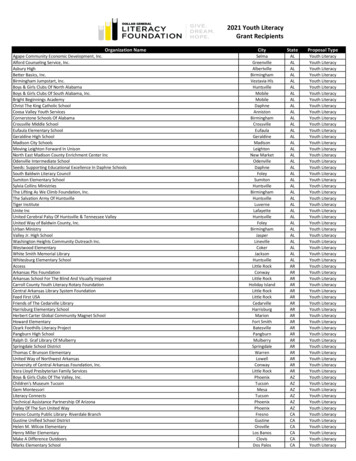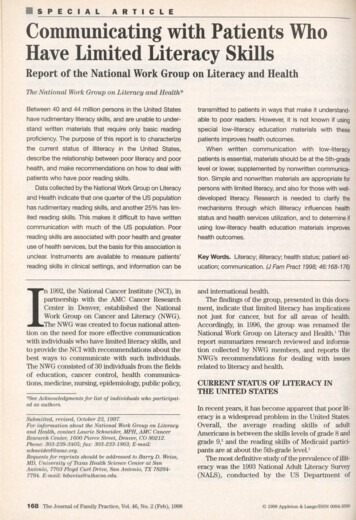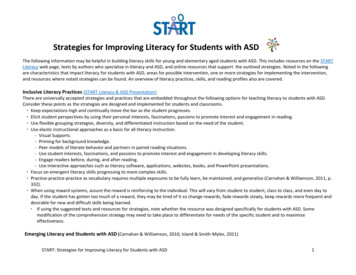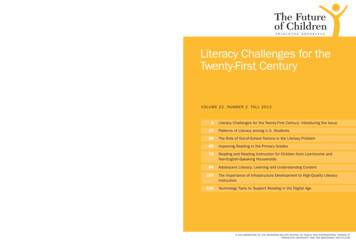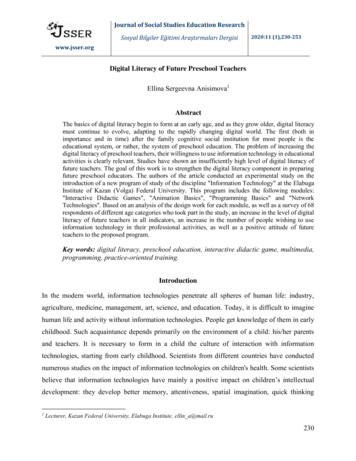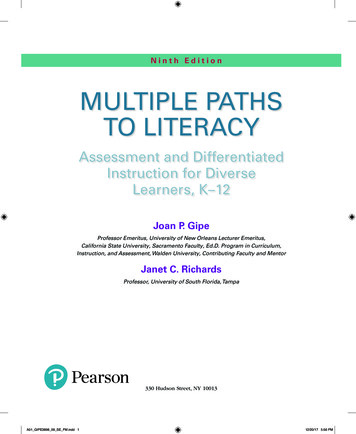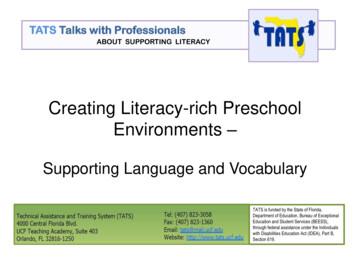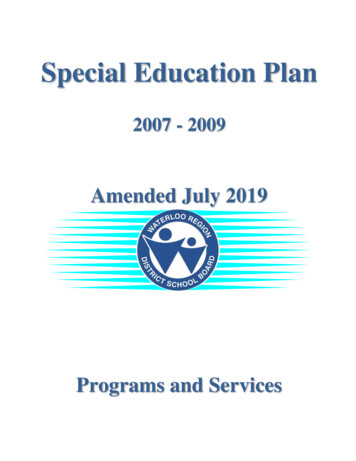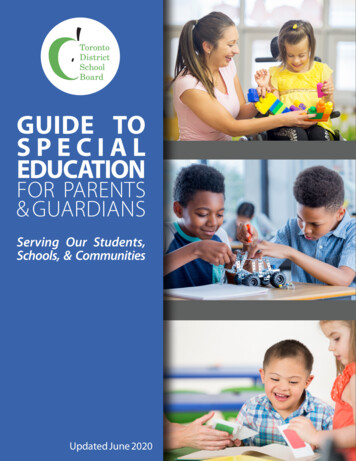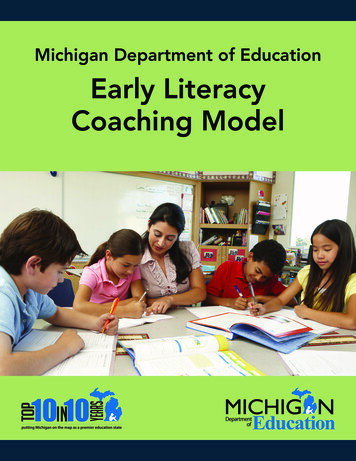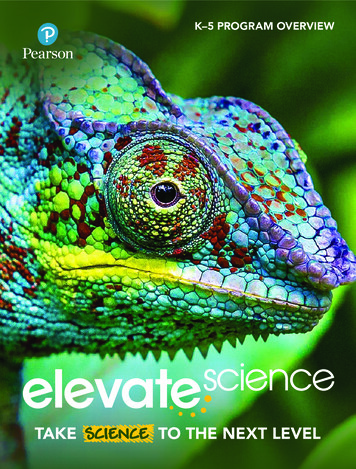
Transcription
Special Education, Language, and Literacy-1Special Education, Language, and LiteracyFaculty: Dell, Chairperson; Anthony, Blumberg, Cheek, Cohen, Hall, Pancsofar, Peel, Petroff, Rao,Rotter, Slobodzian, Smith, Speaker, Strassman, Wong, WuThe Department of Special Education, Language, and Literacy equips students withknowledge and skills to permit entry to the teaching profession as a teacher of individualsThe department also offers undergraduate courses in literacy, children’s literature,inclusion, and development of individuals with disabilities to teacher candidates in earlychildhood education, elementary education, technology education, music education, andsecondary education.The department offers a pre-requisite course of study in speech-language pathologyfor students interested in pursuing graduate study in speech-language pathology.Five-Year Program Preparing Teachers of Individuals with Disabilities Culminatingin a Masters DegreeThe integrated Bachelor’s and Master of Arts in Teaching program in the Education ofIndividuals with Disabilities is designed for students who have completed high schooland who have not yet earned a bachelor’s degree. The program is based on the School ofEducation’s Conceptual Framework for Creating Agents of Change and meets all of thestandards of the Council of Exceptional Children and the Association of ChildhoodEducation International, as well as the requirements of the State of New Jersey forlicensure as a teacher of students with disabilities and teacher of elementary education.Students will earn a bachelor’s degree without teacher certification at the end of theirfourth year. The bachelor’s degree will be a dual major in one of eleven liberal arts andsciences majors and special education. The course of study continues through thefollowing academic year and culminates with the student’s earning a master’s degree inspecial education, New Jersey certification in special education and eligibilityfor NewJersey certification in elementary education. Students will need to meet all requirementsof The College of New Jersey and the School of Education at the end of the fourth year(including an overal GPA of 3.0) in order to enroll in graduate courses in the fourth year.At the undergraduate level, the student must select one of the following liberal arts andsciences majors:, English, mathematics, history, biology, Spanish, music, psychology,sociology, math/science/technology, art, music, and women and gender studies. (Thedepartment also offers a five-year dual certification program in the education of the deafand hard of hearing and elementary education leading to a masters degree—see below.)Requirements for the Teachers of Individuals with Disabilities Major Students must complete the liberal learning requirements as defined by The Collegeof New Jersey. Students must complete a second major from the list providedabove. Students must complete the following coursework at the undergraduate level: MST202, MTT202, RAL 220, RAL 225, RAL 320, SLP 102, SPE 103, SPE 203, SPE324 SPE 214, ,SPE 322, SPE 490. Students should complete MAT 105 or MAT 106 as part of their liberal learningrequirements. Students must complete the following coursework at the graduate level in order togain teacher certification: SPED 521, SPE 522, SPED 515, SPED 631or SPED609, SPED 647 or RDLG 571, SPED 648 or RDLG 579, EDUC 513, SPED 695,SPED 597, SPED 664.This includes a three-course specialty sequence. SeeGraduate Bulletin for further information.
Special Education, Language, and Literacy-2Admission1. The department reserves the right to limit enrollments in the program whennecessary or desirable.2. Formal admission to the program is granted at the end of sophomore year only tothose students who have met the departmental requirements (including an overallGPA of 2.5) as well as those of the School of Education and of the College.3. Departmental application forms must be filed by students desiring to transfer fromother departments in the College. The application process includes completing anapplication and a written response to a designated topical question. Interviews ofapplicants are required. A minimum GPA of 2.75 is required to transfer into theprogram.4. Proficiency level of all students admitted to the major will be continuallyassessed. Students not meeting accptable proficiency levels in the areas of orallanguage, spelling, writing, reading, and mathematics skills may not be permittedto continue in the program. In addition, students must evidence satisfactoryperformance in Disposition Standards (*) as assessed in SPE 103, SLP 102, SPE214 and SPE 324.(*) Habits of Thinking and Action Toward Learning, Teaching, Professional Conduct,Interpersonal Relationships, and Self Awareness.5. Students transferring from another department should check the special educationwebsite (http://www.tcnj.edu/ educat/special/) for specific information pertainingto transfer students.Academic RegulationsIn compliance with the State of New Jersey’s regulations, a student must have a gradepoint average of 2.5 prior to enrolling in the pre-professional experience block of courses,beginning in the third year. At the completion of the fourth year of study, the student’sgrade point average will be assessed to determine if the standard for graduate study, aspart of the five-year program, at TCNJ, has been met (overall GPA of 3.0). Students mustrepeat a required department or program correlate course in which a grade of D or F hasbeen received. Such a course may be repeated only once. Students unable to meetdepartmental criteria as noted will be dismissed from the department. Dismissal will bemade at the end of the academic year.Transfer StudentsThe program is sequential in nature and structured with courses offered only duringcertain semesters. Potential transfer students must realize that this may prolong theirprograms by as much as one year in some cases. Transfer students who are accepted intothe program must schedule courses with advisement of the program coordinator.Outside transfers must complete an admissions process through the Collegeadmissions office. Departmental review of external transfer applications occursimmediately subsequent to the date published by the College. Interview of applicantsmay be required. A minimum grade of B is required in English Composition. Studentstransferring from other schools should check the special education website for specificinformation pertaining to transfer students.
Special Education, Language, and Literacy-3Program Entrance, Retention, and Exit StandardsEvery major program at the College has set standards for allowing students to remain inthat program, to transfer within the College from one program to another, and to graduatefrom a program. The following are the standards for the Teacher of Individuals withDisabilities program. Minimum grades are noted in parentheses. Retention in the program is based on the following academic performance standardsin these “critical content courses”: SPE 103 (B–), SPE 203 (B–), SLP 102 (B-)SPE 214 (B–),RAL 220 (B–) and SPE 324 (B-). In additon, students mustevidence satisfactory performance in Disposition Standards as measured in SPE103, SLP 102, SPE 214, SPE 324, and RAL 320 (*)(*) Habits of Thinking and Action Toward Learning, Teaching, Professional Conduct,Interpersonal Relationships and Self Awareness. Transfer into the program from another program within The College is basedupon the following performance standards in these “foundation” courses: WRI102, if not exempted (B); FSP (B); SPE 103 (B). To graduate, the student must earn a minimum grade of C in MAT 105 or MAT106 (in order to take MTT 202) and a B- in RAL 320, SPE 322, and SPE 490. A student’s other course work will depend in part on his or her second major. Seerequirements for individual majors in the Schools of the Arts andCommunications; Humanities and Social Sciences; Engineering; and Science. At the end of their 4th year, students must have a minimum overall GPA of 3.0 inthe special education major for admission to graduate study at TCNJ.Suggested First-Year SequenceSpecial Education/ArtFallFSP First SeminarSPE103/ The Social and Legal Foundations of Special EducationAFA 111/Drawing IAAH 105/Art History I: Cave to CathedralsSpringMAT 105/Math Struct-Algor I or MAT 106/Math Struct-Algor IIWRI 102 (if not exempted)*AFA 112/Conceptual Art StudioorAFA 113/Color Theory/2D DesignSLP102/Language, Speech, and Communiction DevelopmentSPE203/Psychology and Development of Children and AdolescentsWith and Without Disabilities1 course unit1 course unit1 course unit1 course unit1 course unit1 course unit1 course unit1 course unit1course unit*It is recommended that students exempted from this course take, in order of priority, MAT 105, MAT 106,a US history course or liberal arts elective
Special Education, Language, and Literacy-4Special Education/BiologyFallFSP/First SeminarSPE103/The Social and Legal Foundations of Special EducationBIO185/Themes in BiologyCHE 201/General Chemistry ISpringSLP102/Language, Speech, and Communiction DevelopmentSPE203/Psychology and Development of Children and AdolescentsWith and Without DisabilitiesWRI 102 (if not exempted)*CHE 202/General Chemistry IIBIOOption 11 course unit1 course unit1 course unit1 course unit1 course unit1course unit1 course unit1 course unit1 course unit*It is recommended that students exempted from this course take, in order of priority, MAT 105, MAT 106,a US history course or liberal arts electiveSpecial Education/EnglishFallFSP/First SeminarSPE103/The Social and Legal Foundations of Special EducationLIT201/Approaches to LiteratureMAT 105/Math Struct-Algor I or MAT 106/Math Struct-Algor IISpringSLP102/Language, Speech, and Communiction DevelopmentSPE203/Psychology and Development of Children and AdolescentsWith and Without DisabilitiesWRI 102 (if not exempted)*LIT217/Issues in Multicultural Literature1 course unit1 course unit1 course unit1 course unit1 course unit1course unit1 course unit1 course unit*It is recommended that students exempted from this course take a US history course or liberal artselectiveSpecial Education/HistoryFallFSP/First SeminarSPE103/The Social and Legal Foundations of Special EducationHIS210/Craft of HistoryMAT 105/Math Struct-Algor I or MAT 106/Math Struct-Algor IISpringSLP102/Language, Speech, and Communiction DevelopmentSPE203/Psychology and Development of Children and AdolescentsWith and Without DisabilitiesWRI 102 (if not exempted)*HIS260/Themes in American HistoryorHIS230/The United States in World History1 course unit1 course unit1 course unit1 course unit1 course unit1course unit1 course unit1 course unit*It is recommended that students exempted from this course take another liberal learning course.
Special Education, Language, and Literacy-5Special t SeminarSPE 103/The Social and Legal Foundations of Special EducationTST 171/Fundamentals of TechnologyTST 161/Creative DesignSpringSLP102/Language, Speech, and Communiction DevelopmentSPE203/Psychology &Development of Children and AdolescentsWith and Without DisabilitiesTST 181/Structures and MechanismsWRI 102 (if not exempted)1 course unit1 course unit1 course unit1 course unit1 course unit1course unit1 course unit1 course unit*It is recommended that students exempted from this course take, in order of priority, MAT 105 or MAT200(by M/S/T advisement), a US history course or liberal arts electiveSpecial Education/MathematicsFallFSP/First SeminarSPE103/The Social and Legal Foundations of Special EducationMAT 127/Calculus AMAT 200/Proof Writing throughDiscrete MathematicsSpringSLP102/Language, Speech, and Communiction DevelopmentSPE203/Psychology and Development of Children and AdolescentsWith and Without DisabilitiesWRI 102 (if not exempted)*MAT 128/Calculus B1 course unit1 course unit1 course unit1 course unit1 course unit1course unit1 course unit1 course unit*It is recommended that students exempted from this course take, in order of priority, MAT 105 or MAT106, a US history course or liberal arts electiveSpecial/ Education/MusicFallFSP/First SeminarSPE103/The Social and Legal Foundations of Special EducationMUS 261/Musicianship IMUS 251/Music of Our Diverse WorldMUS 200-224orMUS 300-324MUS large ensemble1 course unit1 course unit1 course unit.5 course unit.25 course unit.5 course unit.25 course unitSpringSLP102/Language, Speech, and Communiction Development1 course unitSPE203/Psychology andDevelopment of Children and AdolescentsWith and Without Disabilities1course unitWRI 102 (if not exempted)*1 course unitMusic courses as per music departmentvariable*It is recommended that students exempted from this course take, in order of priority, MAT 105 or MAT106, a US history course or liberal arts elective
Special Education, Language, and Literacy-6Special Education/PsychologyFallFSP/First SeminarPSY 101/General PsychologyMAT 105/Math Struct-Algor I or MAT 106/Math Struct-Algor IISPE103/The Social and Legal Foundations of Special EducationSpringSLP102/Language, Speech, and Communiction DevelopmentSPE203/Psychology and Development of Children and AdolescentsWith and Without DisabilitiesPSY 121/Methods and Tools of PsychologyWRI 102 (if not exempted)*1 course unit1 course unit1 course unit1 course unit1 course unit1course unit1 course unit1 course unit*It is recommended that students exempted from this course take a US history course or liberal artselective**Students who earned AP credit (score of 4 or 5) for psychology should enroll in PSY 121Special Education/SociologyFallFSP/First SeminarSPE103/The Social and Legal Foundations of Special EducationMAT 125/Calculus for Business and the SocialSciences or Statistics/ or STA/115 StatisticsSOC 101/Introduction to SociologySpringSLP102/Language, Speech, and Communiction DevelopmentSPE203/Psychology and Development of Children and AdolescentsWith and Without DisabilitiesWRI 102 (if not exempted)*STA 115/Statistics or STA 216/Statistical Inference1 course unit1 course unit1 course unit1 course unit1 course unit1course unit1 course unit1 course unit*It is recommended that students exempted from this course take, in order of priority, MAT 105 or MAT106, a US history course or liberal arts electiveSpecial Education/SpanishFallFSP/First SeminarSPE 103/The Social and Legal Foundations of Special EducationMAT 105/Math Struct-Algor I or MAT 106/Math Struct-Algor IISpanish Class (specific course based on placement exam performance)SpringSLP102/Language, Speech, and Communiction DevelopmentSPE203/Psychology and Development of Children and AdolescentsWith and Without DisabilitiesWRI 102 (if not exempted)*Spanish Class (specific course based on first semester placement)1 course unit1 course unit1 course unit1 course unit1 course unit1course unit1 course unit1 course unit*It is recommended that students exempted from this course take a US history course or liberal artselective
Special Education, Language, and Literacy-7Special Education/Women and Gender StudiesFallFSP/First SeminarSPE103/The Social and Legal Foundations of Special EducationWGS 200/Women, Culture, and SocietyMAT 105/Math Struct-Algor I or MAT 106/Math Struct-Algor IISpringSLP102/Language, Speech, and Communiction DevelopmentSPE203/Psychology and Development of Children and AdolescentsWith and Without DisabilitiesWRI 102 (if not exempted)*WGS (major course by advisement)1 course unit1 course unit1 course unit1 course unit1 course unit1course unit1 course unit1 course unit*It is recommended that students exempted from this course take a US history course or liberal artselectiveFive-Year Dual Certification in the Education of the Deaf and Hard of Hearing andElementary Education culminating in a Master’s DegreeThe integrated bachelor’s and Master of Arts in Teaching degree in Education of the Deafand Hard of Hearing/Elementary Education is designed for students who have completedhigh school and are first-time college students and for transfer students from communitycolleges or four-year programs who have not yet earned a bachelor’s degree. Theprogram is based on the School of Education’s conceptual framework for preparingexemplary professionals and meets all of the standards of the Council on Education of theDeaf (CED), as well as the requirements of the State of New Jersey for licensure as ateacher of the deaf and hard of hearing, K–12, or as an elementary-level teacher. Havingcompleted a dual major in a liberal arts and sciences area and in deaf education, studentswill earn a bachelor’s degree without teacher certification at the end of their fourth year.The course of study, however, continues through the following summer and academicyear and culminates with the student’s earning a master’s degree. At this time, allapplicable certifications are earned. Students will need to meet all requirements of TheCollege of New Jersey and the School of Education at the end of the fourth year in orderto be admitted to the fifth year. At the undergraduate level, the student must select one ofthe following liberal arts majors as a second major to complement the first major ineducation of the deaf and hard of hearing: art, English, mathematics, history, biology,Spanish, music, psychology, sociology, women and gender studies, ormath/science/technology. Any student seeking additional endorsements or teachingcertificates beyond what is specifically awarded by their academic program shouldcontact the State of New Jersey Department of Education directly for details about anyadditional courses or standardized tests that may be required.Requirements for the Education of the Deaf or Hard of Hearing Major Students must complete the liberal learning requirements as defined by The Collegeof New Jersey. This includes a course in US history; a course in children'sliterature; a course in music, art or theatre; and a lab science. Students mustcomplete a second major from the list provided above. Students must complete the following coursework at the undergraduate level: DHH105, DHH 330, DHH 350, DHH 423, MST 202, MTT 202, RAL 220, RAL 225 orWGS 225 or ECE 102, SLP 102, SLP 304, SPE 203, LNG 201.
Special Education, Language, and Literacy-8 All Deaf Education majors are required to show proficiency in American SignLanguage (ASL). Satisfactory evidence of proficiency is completion of the 103level of language study (equivalent to three semesters). Students who are beginningthe study of American Sign Language as a new foreign language should enroll at the101 level. All Deaf Education majors who are continuing the study of ASL based oncourses taken at another institution must take the TCNJ ASL Placement Test forplacement in the appropriate course level. Native users of ASL must also take theplacement test. The TCNJ ASL Placement Test is offered two times per year. It is anin-person interview which requires that an appointment be made for the test. Datesfor the ASL Placement Test are announced athttp://www.tcnj.edu/ educat/deafed/AmericanSignLanguage.htm Students should complete MAT 105 or MAT 106 as part of their liberal learningrequirements. Students must complete the following coursework at the graduate level in order togain teacher certification: DFHH 522, DFHH 530, DFHH 597, DFHH 690,ELEM 695, EDUC 513, EDUC 614, RDLG 579, ELEM 520, ESLM 578 or 587or 525. See Graduate Bulletin for further information. Prior to placement in a field experience, students must recieve Harassment,Intimidation and Bullying Prevention (HIB) training. Students must complete a minimum of 32 undergraduate units while fulfilling allrequirements of both majors and of the Liberal Learning program to be eligiblefor the BS degree. Graduate courses completed during the undergraduate courseof study do not apply toward the BS degree.Academic RegulationsIn compliance with the State of New Jersey’s regulations, a student must have a gradepoint average of 2.5 prior to enrolling in the junior-level course work in education. At thecompletion of the fourth year of study, the student’s grade point average will be assessedto determine if the standard for graduate study at TCNJ has been met. Students mustrepeat a required departmental course in which a grade of D or F has been received. Sucha course may be repeated only once. Students unable to meet departmental criteria asnoted will be dismissed from the department. Dismissal will be made at the end of theacademic year.Program Entrance, Retention, and Exit StandardsEvery major program at the College has set standards for allowing students to remain inthat program, to transfer within the College from one program to another, and to graduatefrom a program. The following are the standards for the five-year program in theeducation of the deaf or hard of hearing. Minimum grades are noted in parentheses. Retention in the program is based on the following academic performancestandards in these “critical content courses”: ASL 101 (B), ASL 102 (C), ASL103 (C), DHH 105 (B), DHH 350 (C), and DHH 423 (B). In addition, studentsmust evidence satisfactory performance in Disposition Standards as measured in,SLP 102, RAL 220, DHH 350 and DHH 423. Also see requirements forindividual majors in the Schools of the Arts and Communications; Humanitiesand Social Sciences; Engineering; and Science.Retention in the program requires that students demonstrate satisfactoryperformance on the School of Education's Assessments of ProfessionalDisposition Standards and Teaching Performance.
Special Education, Language, and Literacy-9 Transfer into the program from another program within the College is based uponthe following performance standards in these “foundation courses”: WRI 102—ifnot exempted (B); FSP (B). Also see requirements for individual majors in the schools of the Arts andCommunication; Humanities and Social Sciences; Engineering; and Science. In order to take MTT 202, students must earn a minimum grade of C in MAT 105or 106.At the end of their 4th year, students must have a minimum GPA of 3.0 foradmission to graduate study at TCNJ. Additionally, in order to take graduate levelclasses during the fourth year, students must have a GPA of 3.0.Transfer Student StandardsThe program is sequential in nature and structured with courses offered only duringcertain semesters. Potential students are advised that this may prolong their programs.Continued advisement is essential to timely program completion.Suggested First-Year SequenceDeaf Education/ArtFallFSP/First SeminarMAT 105 or 106/Mathematical Structures and Algorithm forEducators I or IIAFA 111/Drawing IAAH 105/Art History I: Cave to CathedralsSpringASL 101/American Sign Language IDHH 105/Programs and Services forIndividuals who are Deaf or Hard of HearingWRI 102 (if not exempted)*AFA 112/Conceptual Art StudioAFA 113/Color Theory/2D Design1 course unit1 course unit1 course unit1 course unit1 course unit1 course unit1 course unit1 course unit1 course unit*It is recommended that students exempted from this course take SPE 203.Deaf Education/BiologyFallFSP/First SeminarMAT 105 or 106/Mathematical Structures and Algorithm forEducators I or IIBIO185/Themes in BiologyCHE 201/General Chemistry ISpringASL 101/American Sign Language IDHH 105/Programs and Services forIndividuals who are Deaf or Hard of HearingWRI 102 (if not exempted)*CHE 202/General Chemistry IIBIOOption 1*It is recommended that students exempted from this course take SPE 203.1 course unit1 course unit1 course unit1 course unit1 course unit1 course unit1 course unit1 course unit
Special Education, Language, and Literacy-10Deaf Education/EnglishFallFSP/First SeminarSLP102/Language, Speech, and Communiction DevelopmentLIT200/Introduction to PoetryMAT 105 or 106/Mathematical Structuresand Algorithms for Educators I or IISpringASL 101/American Sign Language IDHH 105/Programs and Services forIndividuals who are Deaf or Hard of HearingWRI 102 (if not exempted)*LIT201/Approaches to Literature1 course unit1 course unit1 course unit1 course unit1 course unit1 course unit1 course unit*It is recommended that students exempted from this course take SPE 203.Deaf Education/HistoryFallFSP/First SeminarSLP102/Language, Speech, and Communiction DevelopmentHIS 210/Craft of History1 course unitMAT 105 or 106/Mathematical Structuresand Algorithms for Educators I or IISpringASL 101/American Sign Language IDHH 105/Programs and Services forIndividuals who are Deaf or Hard of HearingWRI 102 (if not exempted)*Any HIS100-level courseHIS 260/Themes in American History1 course unit1 course unit1 course unit1 course unit1 course unit1 course unit1 course unit1 course unit*It is recommended that students exempted from this course take SPE 203.Deaf Education/Math/Science/Technology-MSTFallFSP/First SeminarMAT 127/Calucus AorETE 131/Engineering Mathematics (by M/S/T advisement)ETE 261/Multimedia DesignTST 161/Creative DesignSpringASL 101/American Sign Language IDHH 105/Programs and Services forIndividuals who are Deaf or Hard of HearingMAT 105 or MAT 200 (by M/S/T advisement)WRI 102 (if not exempted)**It is recommended that students exempted from this course take SPE 203.1 course unit1 course unit1 course unit1 course unit1 course unit1 course unit1 course unit1 course unit
Special Education, Language, and Literacy-11Deaf Education/MathematicsFallFSP/First SeminarSLP102/Language, Speech, and Communiction DevelopmentMAT 127/Calculus AMAT 200/Proof Writing through Discrete MathematicsSpringASL 101/American Sign Language IDHH 105/Programs and Services forIndividuals who are Deaf or Hard of HearingWRI 102 (if not exempted)*MAT 128/Calculus B1 course unit1 course unit1 course unit1 course unit1 course unit1 course unit1 course unit*It is recommended that students exempted from this course take SPE 203.Deaf Education/MusicFallFSP/First SeminarMAT 105 or 106/Mathematical Structures and Algorithm forEducators I or IIMUS 261/Musicianship I1 course unitMUS 251/Music of Our Diverse WorldMUS 200-224orMUS 300-324.5 course unitMUS large ensembleSpringASL 101/American Sign Language IDHH 105/Programs and Services forIndividuals who are Deaf or Hard of HearingMUS 262/Musicianship IIMUS 111/Keyboard SkillsMUS 200-224orMUS 300-324Large Ensemble .25 course unitsWRI 102 (if not exempted)*1 course unit1 course unit.5 course unit.25 course unit.25 course unit1 course unit1 course unit1 course unit.5 course unit.25 course unit.5 course unit1 course unit*It is recommended that students exempted from this course take SPE 203.Deaf Education/PsychologyFallFSP/First SeminarPSY 101/General Psychology*PSY 121/Methods and Tools of PsychologyMAT 105 or 106/Mathematical Structures and Algorithm forEducators I or II1 course unit1 course unit1 course unit
Special Education, Language, and Literacy-12SpringASL 101/American Sign Language IDHH 105/Programs and Services forIndividuals who are Deaf or Hard of HearingWRI 102 (if not exempted)*PSY Foundations1 course unit1 course unit1 course unit1 course unit*It is recommended that students exempted from this course take SPE 203.**Students who earned AP credit (score of 4 or 5) for psychology should enrol in PSY 121Deaf Education/SociologyFallFSP/First SeminarMAT 105 or 106/Mathematical Structures and Algorithm forEducators I or IISTA 115/Statistics or STA 215/Statistical InferenceSOC 101/Introduction to SociologySpringASL 101/American Sign Language IDHH 105/Programs and Services forIndividuals who are Deaf or Hard of HearingWRI 102 (if not exempted)*SOC OptionMAT 105 or 106/Mathematical Structuresand Algorithms for Educators I or II1 course unit1 course unit1 course unit1 course unit1 course unit1 course unit1 course unit1 course unit*It is recommended that students exempted from this course take SPE 203.Deaf Education/SpanishFallFSP/First SeminarSLP102/Language, Speech, and Communiction DevelopmentMAT 105 or 106/Mathematical Structuresand Algorithm for Educators I or IISpanish Class (specific course based on placement exam performance)SpringASL 101/American Sign Language IDHH 105/Programs and Services forIndividuals who are Deaf or Hard of HearingWRI 102 (if not exempted)*Spanish Class (specific course based on first semester placement)1 course unit1 course unit1 course unit1 course unit1 course unit1 course unit1 course unit*It is recommended that students exempted from this course take SPE 203.Deaf Education/Women and Gender StudiesFallFSP/First Seminar1 course unitSLP102/Language, Speech, and Communication Development 1 course unitWGSMAT200/Women, Culture, and Society105 or 106/Mathematical Structures1 course unit
Special Education, Language, and Literacy-13SpringWGSWRIASLDHHand Algorithm for Educators I or II1 course unit301/HIS 385 or WGS 361/HIS 365/AAS 376102 (if not exempted)*101/American Sign Language I105/Programs & Services for the deaf or Hard of Hearing1 course unit1 course unit1 course unit1 course unit*It is recommended that students exempted from this course take SPE 203.Deaf Studies MinorThe Deaf Studies Minor is open to all matriculated students who in their careers will want or needa professional orientation to deaf or hard-of-hearing individuals. The course of study introducesstudents to the communication problems and educational needs associated with deafness. TheAmerican Sign Language sequence of courses meets the college’s Liberal Learning requirementfor study of a second language. (ASL 103 is also offered by the College though is not part of heDeaf Studies Minor.)Students must take the following 4 courses:ASL 101/American Sign Language I (offered fall and spring semesters)ASL 102/American Sign Language II (offered fall and spring semesters)DHH 105/Programs and Services for Individuals who are Deaf or Hard of Hearing (offeredspring semesters)SLP304/ Audiological Assessment and Management of Hearing Loss (offered fallsemesters)Students must choose one of the following courses to complete the minor:DHH 303/La
part of the five-year program, at TCNJ, has been met (overall GPA of 3.0). Students must repeat a required department or program correlate course in which a grade of D or F has been received. Such a course may be repeated only once. Students unable to meet departmental criteria as noted will be dismissed from the department. Dismissal will be
